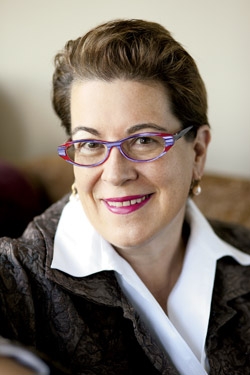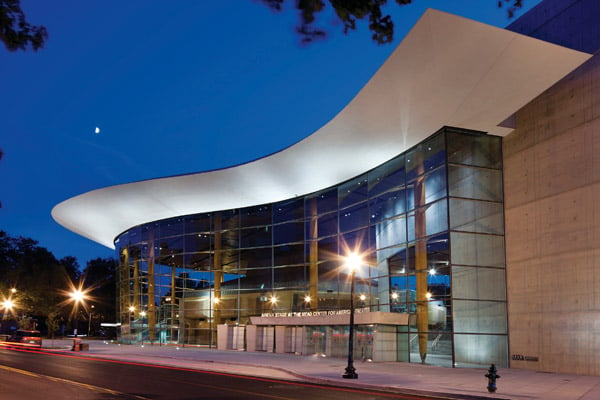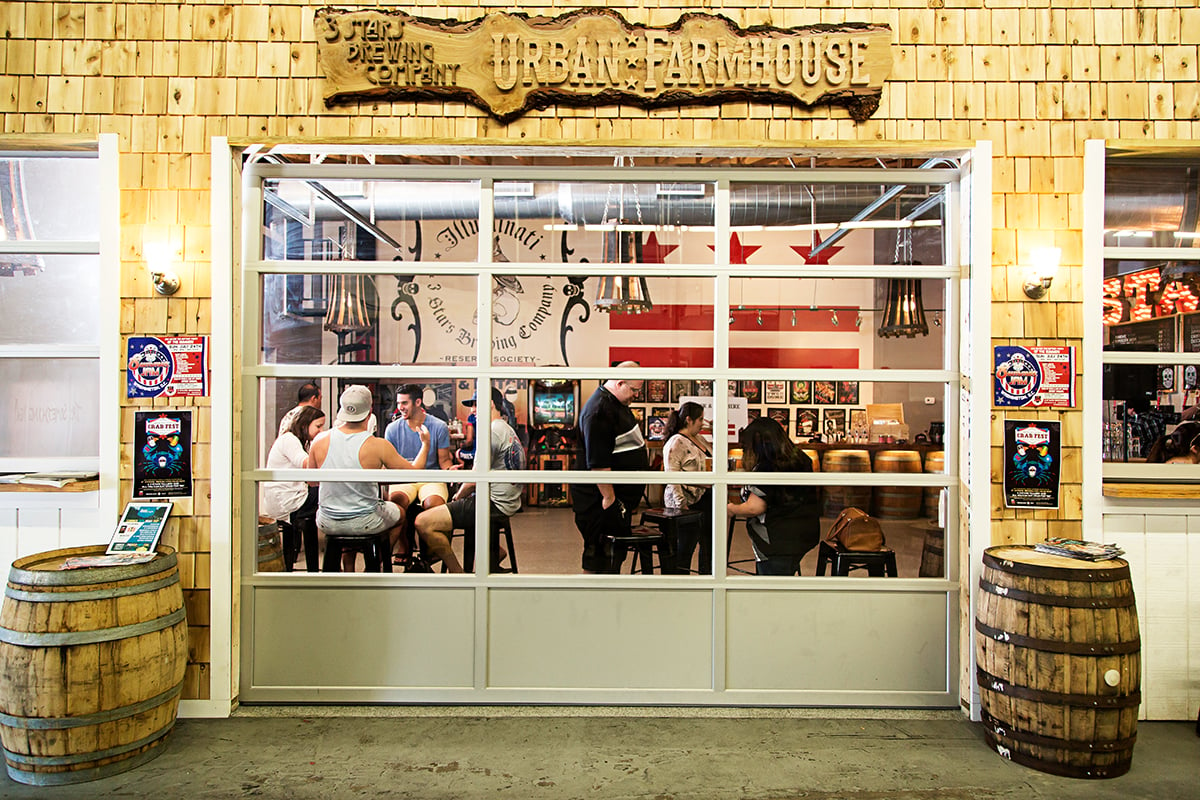The unsinkable Molly Smith, artistic director of Arena Stage, is riding high. Arena has a spectacular new home, thanks in part to a $35-million gift from philanthropists Jaylee and the late Gilbert Mead. The old theater in the round and its little proscenium-stage siblings have gotten an extreme makeover. They’ve been redesigned and wrapped in a glass gift box, ready for their star turn.
Arena Stage at the Mead Center for American Theater opens on October 22 with a production of Oklahoma! “Its message is hope and optimism,” Smith says of the classic musical. “It is perfect for this moment at Arena Stage.”
It took more than optimism to build the $135-million Mead Center. It took 12 years—a period that included two recessions, 9/11, and the sniper shootings, all of which kept many Washingtonians away from the theater. At the same time, Washington experienced a boom in theater construction that made yet another theater—let alone one in Southwest DC—seem foolhardy.
But Smith felt she had to persevere. For the 60-year-old Arena to flourish and attract top talent—such as playwrights Sarah Ruhl and Anna Deavere Smith—as well as draw enthusiastic audiences, it needed bold new spaces.
Perseverance could be Molly Smith’s middle name. In fact, it’s the name of the theater she founded in Douglas, Alaska—near Juneau, where she lived as a teenager—with 50 used theater seats from DC’s old ASTA Theatre that she brought with her after earning degrees from Catholic University and American University.
As a college student, she worked as a drama therapist at St. Elizabeths Hospital and designed her own internships at local theaters, including the former Playwrights Theater and ASTA. Though she didn’t work at Arena, she regularly attended plays there. After earning a master’s in theater at AU, Smith became the first teacher trained by Studio artistic director Joy Zinoman.
Smith’s then-husband, Bill Ray—a high-school sweetheart who had played Bottom to Smith’s Titania in their school production of A Midsummer Night’s Dream—attended the Naval Academy, then served in the Navy. When the military moved the couple back to Alaska at the end of Ray’s service, Smith persuaded the movers to include the 50 theater seats along with their household possessions.
Back home in Alaska, Smith started Perseverance Theatre, naming it after one of the richest gold mines in the state. At 26, she envisioned her new venture as a means to get at the rich culture and literature of Alaska and its people.
Convinced that theatergoers liked stories reflecting their experiences, Smith interviewed dozens of senior citizens, chose the best six storytellers, and, for her first Perseverance production, put them onstage to tell tales of Alaska’s early days. The first night, she put out a couple dozen chairs in the church hall that served as the theater. The next night, she needed 150. The show ran for 200 performances.
Smith and Perseverance prospered. (She eventually divorced, and since 1990 her life partner has been Suzanne Blue Star Boy, a Yankton Sioux who works with Native Americans on land-tenure issues.) But after 19 years with Perseverance, Smith found herself looking for new challenges. She had begun to move away from theater into filmmaking when, in 1998, a headhunter called. Arena Stage was looking for a new artistic director.
Zelda Fichandler and Edward Mangum, a George Washington University professor, founded Arena Stage in 1950. It was the first new theater to open in Washington since 1895.
Asked why so many women have started theaters, Fichandler says, “Perhaps ‘we girls’ started our own because men wouldn’t hire us, didn’t trust us as leaders or to manage money.”
Over the next four decades, Fichandler amassed an impressive list of firsts for Arena. It was DC’s first racially integrated theater; the first regional theater to send a production to Broadway, The Great White Hope—with Jane Alexander and James Earl Jones—in 1968; and the first to receive the annual Tony Award for a regional theater, in 1976.
In 1991, Fichandler left to become artistic director of the Acting Company in New York and head the graduate school of acting at New York University’s Tisch School of the Arts, leaving Arena’s reins to Douglas Wager, who had been working at the theater since starting as an intern in 1974; he later left to direct movies and television in Los Angeles.
When Smith came aboard in 1998, she said she wanted to move Arena’s focus from wide-ranging drama to American works. In her first season, she directed the Pulitzer Prize–winning How I Learned to Drive by her Catholic University classmate Paula Vogel. Smith has balanced works by emerging playwrights such as Karen Zacarías with American classics by Arthur Miller and Eugene O’Neill. She has lured top talent such as African-American director Kenny Leon from Atlanta’s Alliance Theatre Company and actress Valerie Harper, whose performance last year as Tallulah Bankhead in Looped won standing ovations and went to Broadway.
“I’m crazy about Molly Smith,” says dancer and choreographer Maurice Hines, who worked at Arena most recently in Duke Ellington’s Sophisticated Ladies. “She trusts you completely to do the best work you can.” Hines says Smith gives so much freedom to the people she hires that she doesn’t see another director’s production until the last rehearsal and the first preview. Says Hines: “Working with her and Arena Stage—it’s been a joy.”

From the start of Smith’s leadership, many in the local theater world thought she should shift not only Arena’s focus but also its location—out of Southwest DC and into the revitalized downtown district.
Arena’s board was split. Fichandler came down from New York and weighed in on the side of staying put.
Smith admits she was torn: “Right then, downtown looked good.” But building a whole new theater was too expensive, and fitting into a downtown building could mean losing Arena’s concept of theater in the round.
If the theater stayed in the existing space, says Smith, “we needed to dig further into our bloodlines and do something bold.”
Enter Gilbert Mead. He and his wife, Jaylee, had met at NASA in Greenbelt. She was an astronomer; he was a geophysicist. Both were members of Goddard’s amateur musical-theater group—Jaylee performed, and Gil was often musical director.
When the Meads wanted to see how the professionals did it, they went to the theater in DC, starting with visits to Arena Stage. After Gilbert’s father died in 1988 and left him an inheritance, the couple created a foundation to support Washington theaters.
Once they retired from NASA, the Meads moved from Greenbelt to the District and decided to get involved in theater. “Gil really wanted to be on the Arena board,” Jaylee recalls.
He did just that in 1992 and later was a part of discussions about the need for a donor who would underwrite a new building. “After a while, we started thinking that we would make a pledge to match gifts from other donors,” Jaylee Mead recalls. As the list of donors grew, so did the Meads’ gift.
The couple’s influence on Arena was more than financial. Smith had never directed a musical before Gil Mead pressed her to consider it. Her first, the 2003 production of Rodgers and Hammerstein’s South Pacific, was a hit and the most financially successful show in Arena’s history up till then. It’s no accident that Arena’s first production in its new home is another Rodgers and Hammerstein musical, Oklahoma!
The Meads often hosted cast parties at their Watergate apartment. “Actors gathered around the piano, Gil played, and the actors belted out every show tune imaginable,” Smith recalls. “Gil was really in his element.”
He died in 2007. Jaylee Mead keeps alive the family love affair with both musicals and Molly Smith. She says Smith is forceful as a director but doesn’t resort to screaming: “Performers enjoy being directed by Molly. She runs a happy show.”
The Mead Center is the largest performing-arts complex to open in DC since the Kennedy Center rolled out its red carpets in 1971.
It is easy to be awed by what architect Bing Thom and his team have created and the clever homage to the original Arena Stage—the shells of the old buildings remain, right down to the iron staircases at the back.
New amenities include catering supervised by celebrity chef José Andrés, an intimate new “cradle” theater to nourish new works, state-of-the art rehearsal spaces, costume and scenery shops, and classrooms.
Smith shows off her new digs like any new homeowner who has come up in the world. But, she stresses, Arena hasn’t forgotten its roots. The package is large, but the theaters are small—the main theater has fewer seats than the original in order to increase the intimacy and improve acoustics.
And that space is still theater in the round. “It is called Arena Stage, and it will always be about that dynamic shape,” Smith says.
She believes the new Arena gives artists a venue that matches their talent. But it should be noted that the theater did some of its best work while wandering in the wilderness.
During construction of the Mead Center, Arena operated out of borrowed space in Crystal City and DC’s Lincoln Theatre. In 2009, its production of Next to Normal went on to Broadway. Featuring the Arena Stage cast, it picked up three Tony Awards including best performance by a leading actress in a musical for Alice Ripley.
Smith has stacked the deck for her inaugural season in the new space. After Oklahoma!, Arena will produce a world premiere of Marcus Gardley’s Every Tongue Confess, starring Phylicia Rashad, then Let Me Down Easy—conceived, written, and performed by Anna Deavere Smith—and Ruined by Lynn Nottage, the 2009 Pulitzer Prize winner for drama.
What does founding director Zelda Fichandler—now retired from Tisch and back in Washington—think about the new Arena? “I’ve never seen a theater building that is such an invitation to creativity,” she says. “Bing’s soaring roof line reaches up and forward toward the water, air, and sky, which are the ancient roots of theater. It suggests a takeoff to a new beginning.”
This article first appeared in the October 2010 issue of The Washingtonian.



















